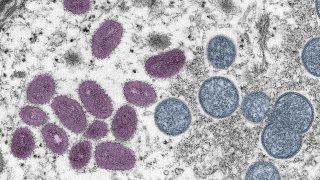
Monkeypox cases have been spreading throughout California and the United States.
Amid a COVID-19 surge, communities wonder if this is another virus they should worry about.
What is monkeypox?
Monkeypox is a rare disease caused by an infection with monkeypox virus which is not naturally in the U.S. This virus is usually associated with travel to West and Central Africa. The monkeypox virus comes from the same family of viruses as smallpox. The virus has appeared in some states in the U.S. and spread through human-human contact.
Current monkeypox outbreak?
Since the discovery of the virus in Africa during the 1970's there have been outbreaks predominantly in Africa. The World Health Organization has reported for the first time instances of clusters in different regions with over 3,000 cases reported in the first half of 2022.
This outbreak has shifted to rename the virus, as the name implies geographic ties to Africa that are incorrect and "discriminatory and stigmatizing," according to WHO officials.
The CDC reported that this outbreak involves a high numbers of cases in men who have sex with men, but anyone in close proximity can contract the virus.
The first confirmed case of monkeypox in the U.S. was reported in Massachusetts on May 18. Since then, California and New York hold the most confirmed cases with CA having 136 and NY having 131 cases.
Get a weekly recap of the latest San Francisco Bay Area housing news. >Sign up for NBC Bay Area’s Housing Deconstructed newsletter.
As of right now, there are an approximate of 54 confirmed monkeypox cases in LA County.
How does monkeypox spread?
- Touching monkeypox lesions on a person's skin.
- Touching contaminated objects, surfaces, and fabrics (clothing, bed, towels).
- Direct contact with respiratory droplets, secretion from eye, nose, and mouth.
What are the symptoms?
- Symptoms onset ranges from 5-21 days.
- Infections can last up to two to four weeks.
- Early signs include fever, muscle aches, headaches, swollen lymph nodes, exhaustion and a sore throat or cough.
- A rash may develop often starting on the face and spreading to the rest of the body, including, hands, feet, eyes, mouth and genitals. Rashes can vary depending on severity between people and change of appearance.
- Skin lesions begin to develop and appear throughout the body, they can change from being flat to bumps to blisters before scabbing over and resolving.
How to prevent the spread?
- Avoid oral, anal, and vaginal sex. Including touching genitals, and anus of monkeypox infected individuals.
- Refrain hugging, massaging, kissing, and talking closely to someone with the virus.
- Resist touching shared fabrics, surfaces and objects.
How is monkeypox treated?
There are currently two FDA approved vaccines available to individuals exposed to the virus. After outbreaks there have been reports of vaccine shortages, the Biden administration announced a plan to distribute 296,000 doses in the upcoming weeks.

